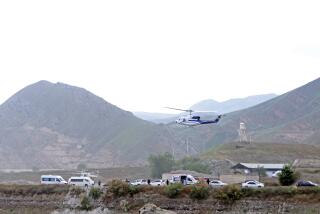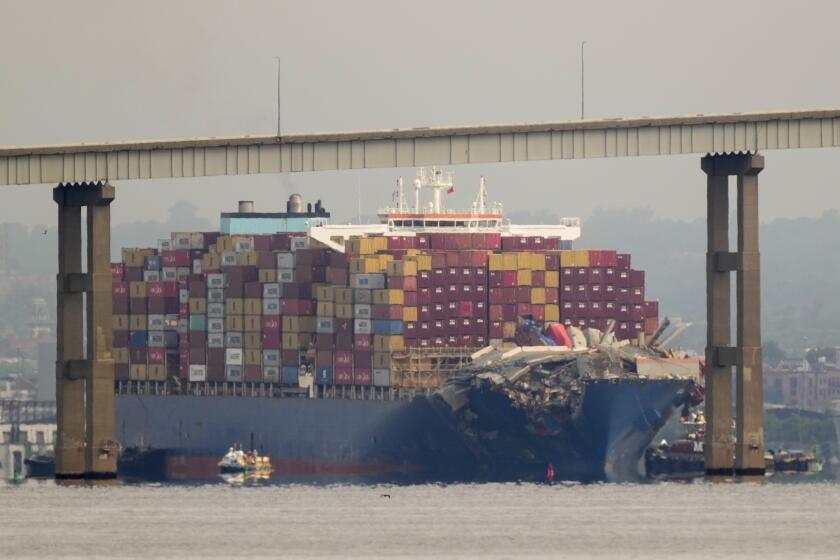U.S. Ignored Signs in Iraq Case, Papers Show : Policy: Officials kept up aid to Baghdad despite evidence in ’89 of its role in bank scheme, records reveal.
Bush Administration officials ignored emerging evidence of Iraqi government involvement in a massive Atlanta bank scandal in the fall of 1989 and continued providing Baghdad with economic assistance to avoid straining relations, according to newly released government documents.
U.S. officials were aware at the time that evidence pointed to Iraqi complicity in the Banca Nazionale del Lavoro loan scheme and strongly suggested that Iraq swapped American food for arms, according to the records.
But those officials failed to divulge the information to a government committee at a key moment when it could have curtailed aid to Iraq, the records show.
Taken with other material disclosed in recent months, the new documents provide the most extensive look yet at the battle inside the Administration to salvage the aid program and maintain ties with Baghdad in the face of mounting evidence of Iraqi wrongdoing.
They also demonstrate how far some U.S. officials went to keep the aid program alive and sustain President Bush’s ill-fated policy of strengthening ties to Saddam Hussein. And one internal Justice Department document provides the strongest statement to date that Iraq may have obtained weapons for food bought with American loan guarantees.
The documents were released Saturday by the Senate Agriculture Committee, which has been investigating the Agriculture Department’s loan guarantees for Iraq.
A State Department spokeswoman declined to comment on the material. Instead, she referred to a letter released last week in which acting Secretary of State Lawrence S. Eagleburger said it has not been proved that Iraq used food bought with U.S. loan guarantees to acquire weapons.
Eagleburger also repeated that the Administration’s goal had been to “moderate Iraqi behavior with a mix of limited incentives and strong disincentives.”
The records shed new light on a critical period in relations between the United States and Iraq.
Bush had just signed a top-secret order mandating closer ties to Baghdad. Yet some Administration officials were proposing to stop the major American aid program for Iraq, and U.S. intelligence agencies were warning that Iraq was engaged in a worldwide arms-buying effort.
The Administration battle was touched off on Aug. 4, 1989. Federal agents raided the Atlanta branch of Italy’s Banca Nazionale del Lavoro and found evidence of $5 billion in fraudulent loans to Iraq. Nearly $2 billion of those loans were guaranteed by the Agriculture Department’s Commodity Credit Corp., which allowed Iraq to buy American commodities on credit.
The Administration was proposing another $1 billion in CCC guarantees for Iraq. The Federal Reserve, Treasury Department and Export-Import Bank had reservations because of concerns about Iraq’s ability to pay the loans. But the State Department and White House were pushing the package as a foreign policy initiative.
As evidence emerged of Iraqi government involvement in the fraudulent loans at BNL, the Agriculture Department proposed cutting CCC aid to $400 million. Iraqi Foreign Minister Tariq Aziz told Baker on Oct. 6, 1989, that $400 million was unacceptable.
According to one of the new documents, two days later, Nizar Hamdoon, a senior Iraqi official, warned U.S. diplomats in Baghdad that Iraq would halt payments on $2.3 billion in existing CCC-guaranteed loans unless the United States provided the new loan guarantees.
“With his mailed fist still in his velvet glove, Hamdoon then pointed out that Iraq does have alternative sources of supply,” the cable recounted.
The stakes were high. On Oct. 11, two Agriculture Department officials, Kevin Brosch and Larry McElvain, were dispatched to Atlanta to find out how much the investigators had uncovered about Iraqi involvement in the BNL fraud. Accounts of the briefing differ.
Frank Lemay, a State Department official, wrote a memo on Oct. 13, 1989, in which he said Brosch had told him the Atlanta investigators had expressed grave concerns about Iraqi involvement in the BNL scheme.
Lemay said Brosch had said Iraqi officials were involved in the BNL scandal and U.S. exporters who refused to pay bribes to Iraq were blacklisted. Brosch also said American goods bought with CCC guarantees might have been traded for arms and some CCC funds might have gone for nuclear weapon technology, according to the memo.
Brosch’s information had an immediate impact at the Agriculture Department. According to a newly released memo to then-Secretary Clayton K. Yeutter, the department suspended all talks with Iraq on new CCC aid on Oct. 12.
When Secretary of State James A. Baker III was told of that plan the next day, he ordered subordinates to “get it back onto the table.”
Over the next three weeks, there were many discussions within the Administration about the CCC program and the Atlanta inquiry. They came to a climax on Oct. 31, when Baker telephoned Yeutter and persuaded him to restore the full $1 billion.
But the final decision depended on support from an interagency group called the National Advisory Council. With the Federal Reserve and Treasury Department still opposing the aid, Brosch prepared a report on the BNL investigation for the NAC’s Nov. 8 meeting.
The report, also released Saturday, said suspicions that CCC-backed grain had been used by Iraq for arms purchases were the result of a clerical error. It played down pressure on U.S. exporters for bribes and did not mention that CCC aid might have bought nuclear technology.
As for Iraqi government involvement, the report concluded, “it does not appear that there is any evidence that has been adduced to indicate Iraqi wrongdoing with respect to the (CCC) program arising out of the BNL affair.”
The full $1 billion was approved, although it was divided into two halves. In explaining his vote for the aid, Federal Reserve Gov. Edmund Kelley said at the NAC meeting that the report reassured him “that the investigation had not yet revealed culpability on the part of the Iraqis.”
While the report had not been disclosed previously, Brosch was questioned about Lemay’s memo last May by the House Banking Committee. He said the Lemay memo was wrong. “Those notes are totally misleading,” he said.
Attempts to reach Brosch last week were unsuccessful, but Agriculture officials have said in the past that Lemay misunderstood what Brosch told him.
However, the lead prosecutor in Atlanta responded to Brosch’s testimony with a memo of her own on June 16. It supports Lemay’s memo and contradicts the critical 1989 report to the NAC, according to a copy released Saturday.
Assistant U.S. Atty. Gale McKenzie wrote that Brosch and McElvain were told on Oct. 11, 1989, that investigators had uncovered evidence of “criminal complicity of certain Iraqi government officials” in the BNL scheme and CCC loan abuses. She said they also were told BNL loans had been used by Iraq to buy technology with military uses, including specific nuclear goods.
On the question of grain-for-guns, McKenzie said the Agriculture officials were told: “Iraqi purchases of more CCC-guaranteed commodities than could be reasonably consumed in Iraq . . . strongly indicated barter, transshipment or other diversion.”
Four Iraqi government officials were indicted in the Banca Nazionale del Lavoro scandal in February, 1991, and it has emerged since that millions of dollars in BNL loans were used for military purposes by Iraq, including improving the Scud missiles that killed 28 American soldiers in the Persian Gulf War.
Prosecutors are still investigating the diversion of CCC commodities.
More to Read
Start your day right
Sign up for Essential California for news, features and recommendations from the L.A. Times and beyond in your inbox six days a week.
You may occasionally receive promotional content from the Los Angeles Times.






